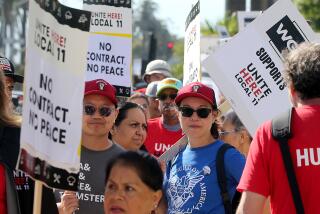POSTAL WAR OF WORDS IN NBC STRIKE
- Share via
NEW YORK — NBC’s president and executives of a major union that is striking the network are criticizing each other by mail. And because of the strike, Bill Cosby may shift production of his hit NBC series to a non-NBC studio in Queens.
So it goes in the walkout that began June 29, with the battle of letters between NBC President Robert C. Wright and officials of the striking National Assn. of Broadcast Employees and Technicians.
In the Cosby case, a NABET executive, Art Kent, said he speculated that the comedian-actor didn’t want to cross the union’s picket lines at NBC’s Brooklyn studios, where “The Cosby Show” has been taped the last three seasons.
He said that Cosby’s producers had signed a 13-week contract to tape the show--scheduled to resume production Aug. 10--at the Kaufman Astoria Studios in the New York borough of Queens. However, a spokesman for Cosby said there had been no decision made yet on shifting the show there.
Moving the taping site is “certainly under discussion,” the spokesman, David Brokaw, said in Los Angeles on Friday. “It (the shift) is a probability.” He said a decision was expected shortly.
The program, which has been the top-rated show on national TV almost since its start in 1984, has been a major factor in the rise of NBC from third to dominance in prime-time ratings. It is not produced by NBC, but by Cosby and the Carsey-Werner Co.
An NBC soap opera, “Another World,” is continuing its production at the network’s Brooklyn studio, with management and other personnel filling in for absent NABET camera operators and technicians.
David Letterman, although he has expressed sympathy and support for the strikers, continues to tape his “Late Night With David Letterman” at NBC studios at the company’s headquarters building in Rockefeller Center.
The postal war between NBC and the union began Thursday when a federal mediator who brought the two sides together for four days of talks concluded that there was a stalemate and called the negotiations off.
Shortly after Thursday’s session ended in failure, the company began mailing a letter from Wright to 2,800 striking NABET members and about 5,200 NBC employees still at work.
The letter outlined uncertain times facing the three networks, discussed the issue of “daily hires” that has been a stumbling block in contract talks and denied that NBC--now owned by GE--was out to destroy the union.
Wright’s letter also said:
“I am sorry to report that the present (strike) situation shows no signs of abating. We are faced with a union leadership that seems not to realize that the world is changing and that they must change with it.”
NABET, in a “status report” that it said it was mailing its members over the weekend, assailed Wright’s letter as “an example of GE’s union-busting tactics” and asserted that it was written before Thursday’s talks ended.
As John Krieger, a union spokesman put it: NABET tried “to find solutions to the issues, and they (NBC) already had the script written. They couldn’t have written the letter that quickly.”
McClain Ramsey, an NBC spokeswoman, denied that, saying that Wright’s letter “was based on what happened at the (Thursday) meeting.”
Each side, NABET’s letter said, would be better served if Wright, instead of writing letters, “would come to the bargaining sessions and contribute to the resolution of this strike.”
“This letter will serve as an open invitation.”
Union officials say they called the strike after NBC put into effect a two-year contract that they had rejected in earlier negotiations. Union leaders never put the proposed pact up for a membership vote.
Wright pointedly noted that in his letter. Union negotiators have said that they considered NBC’s proposals “not acceptable.” They decided not to put the proposals to a vote when NBC made what it calls its “final offer” on March 31, the date the union’s previous four-year contract ended.
“At that point we wanted to get back to the bargaining table and not spend the five or six weeks it would take to do a mail ballot and do the voting,” one top union negotiator, Carrie Biggs-Adams, has explained.
Although federal mediators still can call the two sides back to the bargaining table, no meetings have been scheduled.
More to Read
The biggest entertainment stories
Get our big stories about Hollywood, film, television, music, arts, culture and more right in your inbox as soon as they publish.
You may occasionally receive promotional content from the Los Angeles Times.










